Dorling Kindersley Limited
The Penguin Group
2 4 6 8 10 9 7 5 3 1
Published by the Dorling Kindersley Limited,
80 Strand, London WC2R 0RL
LONDON, NEW YORK,
MUNICH, MELBOURNE, DELHI
Dorling Kindersley Limited, Registered Offices: 80 Strand,
London WC2R 0RL, England
www.dk.com
First published in 1998 by Dorling Kindersley Limited. ISBN: 9780751305302
Copyright 1998 Dorling Kindersley
Text Copyright 1998 Tim Hindle
This Digital Edition published 2009. ISBN: 9781405352086
E-Pub version prepared by DK Digital Content Services, London and DK Digital Media, Delhi.
No part of this publication may be reproduced, stored in a retrieval system, or transmitted in any form or by any means, electronic, mechanical, photocopying, recording, or otherwise, without the prior written permission of the copyright owner.
Introduction
Everybody has to manage their time to some extent whether it be at home or at work or both. The sequence in which you perform tasks on an everyday basis has a profound effect on how much you get out of life. Most people have the capacity to manage their time better, and doing so makes the working day more productive and leisure time more fulfilling. Manage Your Time shows how you can improve your own use of time. It is full of practical advice to help you, and 101 concise tips are scattered throughout the content giving further vital information. It begins by examining how you currently manage your time, and looks at the areas that need improvement. It then tells you how to do this in fast, easy stages from how to deal with paperwork to how to communicate in a time-efficient way. The last article shows you how to use your new knowledge to help others manage their time more efficiently.
Understanding Time
Time is our most valuable resource. By analyzing time usage on a regular basis, it is possible to understand the most efficient ways to use time, both in and out of the workplace.
Analyzing Time
Peoples attitudes towards time are complex and variable. If you want to use your time efficiently to accomplish all that you need to do at work and at home, you need to be aware of the current habits and attitudes that shape your use of time.
Changing attitudes
Our attitudes to time are constantly changing. Many of these changes are due to the advent of new technology, which affects our work, travel, and communication. The Internet, e-mail, and modems have made the exchange of information almost instantaneous. Travel, especially over long distances, has become faster and more affordable. The increase in options available has made it possible for us to do more in a day, but has also increased the pressure on our time. This makes it all the more important to use time in the most efficient and productive way.
Cultural differences
Perceptions of time and its usage vary worldwide. Differences are often reflected in the average number of hours worked per day or week, the importance of punctuality, or time spent on leisure activities. Be prepared to adapt to others practices and timetables when working abroad.
Using time wisely
Everybody is increasingly aware of the cost of time. Individuals and departments are held accountable for their use of time: goals are clearly defined and financial penalties are incurred for missed deadlines. Company culture can have an important influence on how employees use their time. In too many organizations, working long hours is equated with working hard; if you leave on time, others may think you are not pulling your weight. In fact, long hours often decrease efficiency and productivity. Ways of using time become habitual, so make an initial investment of time to rethink and improve these habits. The rewards will be the ability to control your workload, and more time to focus on the most important aspects of your job.

Managing queriesA manager who is constantly interrupted has little time for substantial tasks, while staff who must always consult their manager for decisions and information are held up. Use planning and delegation to minimize time-wasting at every level.

Set aside time each day to review and prioritize demands on your time.

Take a small chunk of a difficult task, and deal with it straight away.
Analyzing Use of Time
Few of us will readily admit that large parts of our working day are wasted. The only way for you to make better use of your time is to analyze how you use it now, and then to consider ways in which you can reallocate it in a more effective way.
Assessing your day
There are always competing demands on your time. It is very easy to spend too much time on routine things, such as reading mail, at the expense of high-priority, productive tasks. How do you divide up your day at the moment? Do you prioritize your work so that you tackle important and urgent projects first? Or do you concentrate on completing enjoyable tasks first? Are you distracted by phone calls, or do you have a system for dealing with them? Do you waste a lot of time?
Costing your time
It is a sobering exercise to calculate exactly how much your time costs and then realize how much of it is not being spent effectively. Use the calculation on the right to work out how much your time at work costs per hour and per minute, and then use these figures to analyze the relative cost of a few activities typical of your day, such as arranging a meeting yourself rather than asking your assistant to undertake that task. Always consider whether you should delegate tasks to others: it is generally more cost-effective to give routine tasks to more junior staff rather than doing them yourself, since your cost to the company will be higher.

Estimating valueTo find out the cost of each minute of your time, multiply your annual salary by 1.5 to include overheads and divide the total by the number of working hours in a year (workings hours per week times working weeks per year). Divide this total by 60.
Keeping a time log
Maintaining a daily log of how much time you spend on particular activities is fundamental to managing your time more effectively. You may be surprised at how much time you spend chatting, and how little time you spend working and planning. Your time log provides you with a starting point from which you can assess areas to improve. How long you should keep a time log for is dependent on the nature of your work. If you work on a monthly cycle, keep the log for a couple of months. If your work cycle is weekly, a two- or three-week log should suffice.

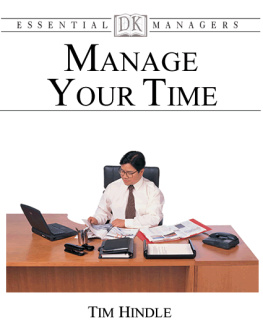
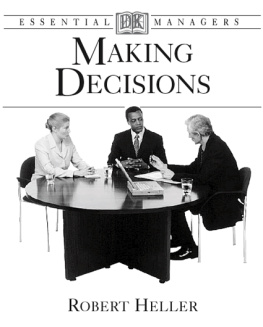


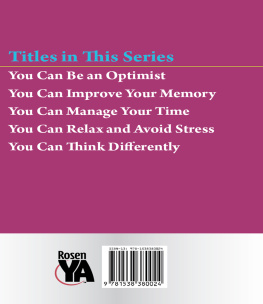
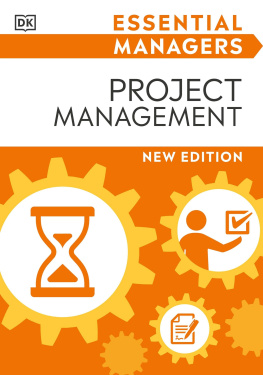
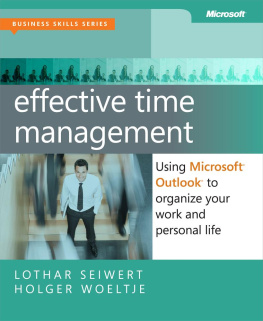
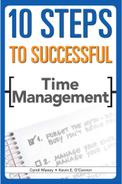
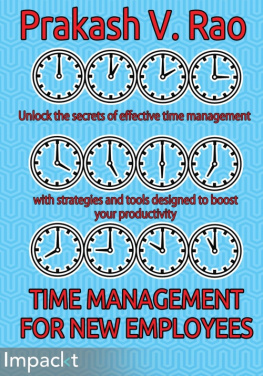
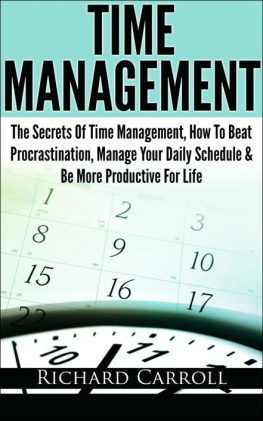




 Set aside time each day to review and prioritize demands on your time.
Set aside time each day to review and prioritize demands on your time.